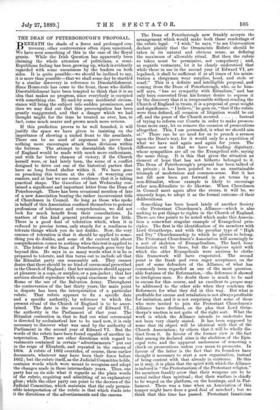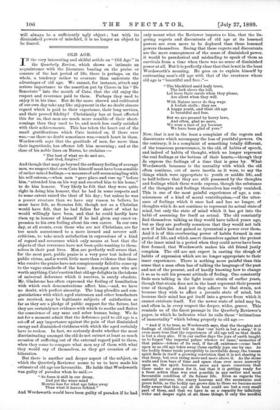THE DEAN OF PETERBOROUGH'S PROPOSAL. B ENEATH the shade of a
fierce and prolonged con- troversy, other controversies often ripen unnoticed. We have seen something of this in the case of the Royal grants. While the Irish Question has apparently been claiming the whole attention of politicians, a semi- Republican feeling has been growing up, which is evidently regarded with some uneasiness by the leaders on both sides. It is quite possible—we should be inclined to say, it is more than possible—that we shall some day be startled by a similar discovery in reference to Disestablishment. Since Home-rule has come to the front, those who dislike Disestablishment have been tempted to think that it is an idea that makes no progress, since everybody is occupied with something else. By-and-by some accidental circum- stance will bring the subject into sudden prominence, and then we may find out that this preoccupation has been greatly exaggerated, and that a danger which we had thought might for the time be treated as over, has, in fact, come much nearer and grown much more serious.
If this prediction proves to be well founded, it will justify the space we have given to insisting on the importance of showing a united front to the assailants. There can be no need of argument to prove that nothing more encourages attack than divisions within the fortress. The attempt to disestablish the Church of England would be made with much more enthusiasm, and with far better chances of victory, if the Church herself were, or had lately been, the scene of a conflict designed to drive out one of the historical parties that have so long found. shelter within it. We have gone on preaching this truism at the risk of wearying our readers, and at last we see some evidence that it is taking practical shape. The Guardian of last Wednesday con- tained a significant and important letter from the Dean of Peterborough. There has been occasional mention of late of a new Association bearing the rather inconvenient title of Churchmen in Council. So long as those who spoke in behalf of this Association confined themselves to general professions of tolerance and. comprehension, we did not look for much benefit from their consultations. In matters of this kind general professions go for little. There is a good deal of toleration which, when it is reduced to precise terms, only stands for a readiness to tolerate things which you do not dislike. Now, the very essence of toleration is that it should be applied to some- thing you do dislike, and some of the current talk about comprehension comes to nothing when this test is applied to it. The letter of the Dean of Peterborough goes very far beyond this. He says in so many words what it is he is prepared to tolerate, and this turns out to include all that the Ritualist party can reasonably ask. They cannot desire that there should be no kind of ceremonial prescribed in the Church of England ; that her ministers should appear at pleasure in a cope, or surplice, or a pea-jacket ; that her services should reproduce with equal exactness the use of Rome or the use of the Salvation Army. Throughout the controversies of the last thirty years, the main point in dispute has been the interpretation of a particular rubric. That rubric appears to fix a specific date and a specific authority, by reference to which the present ritual of the Church of England is to be ascer- tained. The date is the second year of Edward VI., the authority is the Parliament of that year. The Ritualist contention is, that to find out what ceremonial is directed by ecclesiastical law to be used now, it is only necessary to discover what was used by the authority of Parliament in the second year of Edward VI. • But the words of the rubric have been found capable of another in- terpretation. There are other directions with regard. to vestments contained. in certain " advertisements " put out in the reign of Elizabeth, and repeated in the canons of 1604. A rubric of 1662 overrides, of course, these earlier documents, whatever may have been their force before 1662; but the rubric itself, as the Judicial Committee holds, contains words which were meant to recognise and adopt the changes made in these intermediate years. Thus, one party has on its side what it regards as the plain words of the rubric, requiring and admitting of no explanatory gloss ; while the other party can point to the decrees of the Judicial Committee, which maintain that the only permis- sible interpretation of the rubric is that which reads into it the directions of the advertisements and the canons. The Dean of Peterborough now frankly accepts the arrangement which would make both these renderings of the rubric legal. "I wish," he says, "to see Convocation declare plainly that the Ornaments Rubric should be taken in its natural and obvious sense, as defining the maximum of allowable ritual. But then the rubric so taken must be permiasive, not compulsory ; and, as regards vestments, let it be clearly understood that while those in use in the second year of Edward VI. are legalised, it shall be sufficient if at all times of his minis- tration a clergyman wear surplice, hood, and stole or scarf." This is a definite and intelligible proposal, and coming from the Dean of Peterborough, who, as he him- self says, "has no sympathy with Ritualism," and has only been converted from his former desire to repress it by the discovery that it is irrepressible without rending the Church of England in twain, it is a proposal of great weight and significance. "I believe," he goes on, "that if the rubric were thus defined, all occasion of litigation would. be cut off, and the peace of the Church secured Instead of trying to reform our Courts in order to make prosecu- tions more easy, let US remove the occasion of prosecutions altogether. This, I am persuaded, is what we should aim at." There can be no need for us to preach a sermon upon the Dean's text, for it would only be a repetition of what we have said again and again for years. The difference now is that we have a leading dignitary, whose sympathies are all on the Evangelical side, saying the same thing. It is this that gives the situation an element of hope that has not hitherto belonged to it. The Dean of Peterborough's proposal has been talked of in private ; it has been pointed to as an unattainable triumph of moderation and common-sense. But it has not till now been put forward in set terms by a non-Ritualist, whose example is likely to encourage other non-Ritualists to do likewise. When Churchmen in Council meet again after the recess, it will be, we sincerely hope, to adopt it as the formal outcome of their deliberations.
Something has been heard lately of another Society. —the Protestant Churchmen's Alliance—which is also seeking to put things to rights in the Church of England. There are two points to be noted which make this Associa- tion a somewhat singular example of Evangelical prin- ciples. The first is the identification of its members with Lord Grimthorpe, and with the peculiar type of "High and Dry" Churchmanship to which he glories to belong. The Protestant Churchmen's Association will seemingly be a sort of skeleton of Evangelicalism. The hard, bony foundation will be there, but the religious spirit with which the older Evangelicals were anxious to clothe this framework will have evaporated. The second point is the frank and even eager acceptance, on the part of some defenders of the Alliance, of what has commonly been regarded as one of the most question- able features of the Reformation,—the deference it showed to irreligious men. No doubt there is much to be said in excuse for this course, and. an excellent tu quoque may be addressed to the other side when they condemn the Reformers for what they did in this way. But what is profitable for excuse and retaliation is not always profitable for imitation, and it is not surprising that some of those who were invited to join the Protestant Churchmen's Alliance have declined, on the plea that Lord Grim- thorpe's unction is not quite of the right sort. What the work is which the Alliance intends to undertake has not been very clearly stated. It has been supposed by some that its object will be identical with that of the Church Association ; by others that it will be wholly dis- tinct from it. In favour of the former view is the fact that among its declared aims is the abolition of the Epis- copal veto, and the apparent uselessness of removing a check on prosecutions unless you mean to prosecute. In favour of the latter is the fact that its founders have thought it necessary to start a new organisation, instead of being content with that already in existence. Be this as it may, it is plain that the spirit with which the Alliance is imbued is "the Protestantism of the Protestant religion." Its members frankly avow that their weapons are to be carnal rather than spiritual ; that their warfare is chiefly to be waged on the platform, on the hustings, and in Par- liament. There was a. time when an Association of this temper might have done a good deal of mischief ; but we think that this time has passed. Protestant fanaticism will always be a sufficiently ugly object ; but with its diminished powers of mischief, it is no longer an object to be feared.



































 Previous page
Previous page